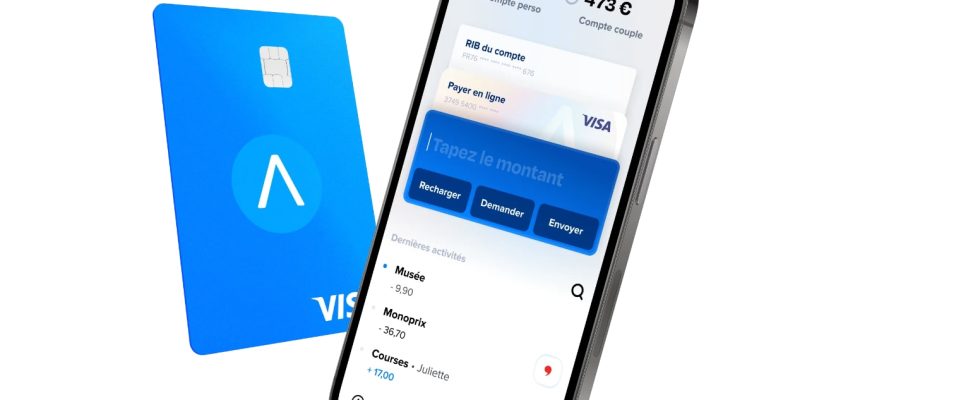“Two people who did not know each other and who knew nothing about it”. In 2011, Cyril Chiche and Antoine Porte met for the first time. Less than two years later, they launched Lydia, a payment application between friends, allowing in a few seconds to transfer money from one smartphone to another. Since then, the two entrepreneurs have come a long way and have just made a major shift in their strategy: the French start-up now intends to compete with online banks, by offering its users the opportunity to open a current account with its lot. Services.
A new version which should allow it to achieve profitability, a big black spot for neobanks, by the end of next year. “They are right to embark on this field, which allows them to offer cards and generate income: it is fundamental for a bank and even more so for a neobank. I find it hard to see how they could make their historic activity profitable. In addition, they are penalized by the system of double verification in transfers, which makes the user journey more complicated”, notes Stéphane Olmi, vice-president of the investment bank Gimar & Co.
The company has, in fact, had a turbulent summer to say the least. Many users have complained about difficulties in making a payment or sending money from their Lydia account to their current account. While the operation was previously done in a snap of the fingers, it is now necessary to go through several stages, including the 3D Secure (3DS) protocol which involves validating everything with your bank. Regardless, the two co-founders remain confident in their ability to offer an optimal user experience.
Investors relieved
The objective displayed today is clear: “Offer the best current account possible”, explains Cyril Chiche. A change of direction welcomed like a breath of fresh air by its main investors. “The fact of daring to say ‘We are a bank’, which was taboo for years at Lydia, is a great relief”, confides Cyril Bertrand, managing partner at XAnge, one of the first funds to have supported the business. In 2020, the young shoot had already pivoted its model by dreaming of itself as a super-app, a portal bringing together several services, like what WeChat offers in China – owned by Tencent, one of Lydia’s shareholders – , before finally throwing in the towel “We thought it was the new model to follow, that if a user came for a service, it was bound to give credibility to the other features. We quickly realized that this was not true”, recognizes Cyril Chiche.
The buried super-app, Lydia is now focusing on the sinews of war: converting its 7 million users, against 50,000 at its launch, into bank customers. “It’s their main asset. The big problem with neobanks is that you have to buy customers, which hampers their profitability. It takes a hundred euros to attract one. And said customer makes a profit on several years, if he has not left in the meantime”, recalls Stéphane Olmi.
Lydia has a significant advantage over the competition here: “Its prescription power, based in particular on a very well thought-out user experience, is extremely strong and constitutes a major monetization lever. The power of the brand is unique and the presence at remarkable young people”, notes Alain Clot, president of France Fintech, the professional association of finance start-ups. You only have to see how the word Lydia entered the common vocabulary. The expression “I make you a Lydia?”, is part of the daily life of many users. “Lydia is the smartphone generation, not the web. These generational stories are often underestimated. Young people do not want to use the tools of their parents or grandparents. It is a marker of differentiation”, completes Cyril Bertrand, from XAnge. Eventually, the name of the company could even one day claim to enter the Robert. But one thing at a time.
Maintain an ideal customer experience
Above all, bosses want to maintain the customer experience at all costs. For this, the developers of the application strive to offer the simplest possible tool. “If you give Spotify or Uber to a seven-year-old child, he knows how to use it. Any banking app, he won’t know,” says Cyril Chiche. In March, the start-up obtained approval as an electronic money institution providing payment services, which authorizes it to offer credit offers in the long term. An undeniable asset to increase its fan base. “It’s a product that builds loyalty, brings the customer a lot closer and, if well managed, can sustain the company economically,” said Alain Clot, of France Fintech.
For the time being, the French market is privileged. But Lydia does not refrain from aiming further in Europe, like the British and German giants Revolut and N26. “If we can’t do it in France, it’s not worth going elsewhere. I nevertheless have good hope that our European ambition will materialize”, wants to believe Cyril Chiche. The start-up can rely on solid cash, consolidated for the next four years. In 2021, she raised 103 million euros, becoming at the same time the 22nd French unicorn. “I’m not sure it’s still worth a billion euros,” nevertheless tempers a connoisseur of the sector. “They communicate very little, but they are succeeding, recruiting tens of thousands of new customers each month,” says someone close to the company. A good omen for the future.
